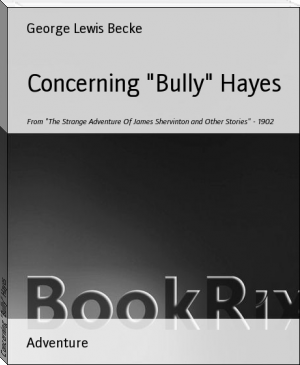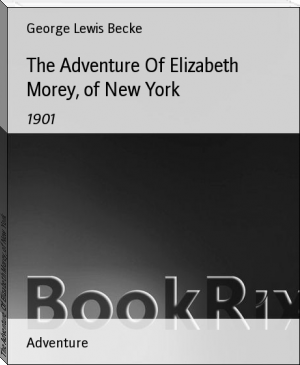Concerning "Bully" Hayes by George Lewis Becke (always you kirsty moseley TXT) 📖

- Author: George Lewis Becke
Book online «Concerning "Bully" Hayes by George Lewis Becke (always you kirsty moseley TXT) 📖». Author George Lewis Becke
For two years or so I remained in the employ of the trading firm. Hayes then lived in Apia--or rather at Matautu, on the east side of Apia Harbour. When I say lived there, I mean that Samoa was his headquarters, for he was absent six months out of the twelve, cruising away in the North West Pacific among the Caroline and Marshall Groups. His house at Matautu Point was sweetly embowered in a grove of coco-nut and breadfruit trees, and here the so-called pirate exercised the most unbounded hospitality to the residents and to any captains (not Germans) visiting Samoa. Sometimes we would meet, and whenever we did he would urge me to come away with him on a cruise to the north-west; but duty tied me down to my own miserable little craft, a wretched little ketch of sixty tons register, that leaked like a basket and swarmed with myriads of cockroaches and quite a respectable number of centipedes and scorpions.
But it so came about that that cruise with Bully Hayes was to eventuate after all; for one day he returned to Samoa from one of his periodical cruises and told the owners of the aforesaid basket that he could sell her for them to the King of Arhnu--one of the Marshall Islands--for quite a nice sum. And the owners, being properly anxious to get rid of such a dangerous and unprofitable craft before she fell to pieces, at once consented.
Hayes sailed in the _Leonora_ in the month of November, and it was agreed that I was to follow in _The Williams_ (that being the name of my semi-floating abode of misery) in the following month, and meet him at Milli Lagoon, in the Marshall Islands. Here we were to doctor up the wretched little vessel as well as we possibly could, and then send her over to the Island of Arhnu in the same group, and defraud the monarch of that place of L1,000 by handing over the vessel to him.
Of the miseries and hardships of that voyage from Samoa to the Marshall Islands, I shall not speak. After a passage of forty-three days we reached Milli Lagoon, where we found Hayes awaiting us in the _Leonora_. The moment our anchor had touched bottom, I packed up my traps and told Hayes I had done with _The Williams_, and refused to go any further in her unless she was carried on the deck of another vessel. With his carpenter--a pig-eyed Chinaman--he made a survey of the vessel, and then told me that she was so rotten and unseaworthy that he would not take delivery of her. The captain, a gin-sodden little Dutchman, and the crew were given quarters on shore at the house of Hayes's local trader, where they were to remain till some passing ship gave them a passage back to Samoa. The ketch was then beached, as Hayes considered that she might eventually be patched up sufficiently to sell to the King of Arhnu, when the _Leonora_ returned from her cruise to the islands of the North-west Pacific, in six months' time. As I had received no salary from my employers for nearly twelve months (and did not expect any), I consented very cheerfully to this arrangement, and then agreed to sail with Hayes as supercargo.
We sailed from Milli Lagoon for the Kingsmill Group a week later, and visited nearly every island in the cluster, buying coco-nut oil and other produce from the natives and the few scattered white traders. At Arorai, the southernmost island of the group, we found the natives in a state of famine owing to a long and disastrous drought. The condition of these poor people was truly pitiable to see, and the tears came to my eyes when I saw them, scarcely able to stand, crawling over our bulwarks, and eagerly seizing the biscuits and dishes of boiled rice that Hayes gave them with an unstinting hand. They begged us most piteously to take them away somewhere--they cared not where, Samoa, Fiji or Queensland--where they could work on the plantations and at least get food. Five of them ate so voraciously, despite all our endeavours to prevent it, that they died the following day. On the following morning, Hayes called several of the head men of the island into his cabin, and told them that if they were willing, he would take one hundred of the people--men, women, and children--to the German trading station and plantation at Ponape in the Caroline Islands. Here, he told them, they would have to work for three years for 5 dollars per month each. If, at the end of six months, they found that the Germans did not treat them well, he would bring them back again to their own island on his next voyage to Ponape. They accepted his offer with the strongest protestations of gratitude, and before noon we sailed with over a hundred of the poor people on board. Before we left, however, Hayes gave the remainder of the population nearly a ton of rice and several casks of biscuits. "You can pay me when the sky of brass has broken and the rain falls, and the land is fertile once more," said the so-called pirate.
We made a quick passage to the Caroline Islands, touching at Kusaie or Strong's Island on our way, and on a Sunday evening swept into Jakoits Harbour on the island of Ponape before a strong trade-wind. Here we made engagements for our passengers with a German planter, and two days later we again were at sea, bound for the western portion of the Carolines.
For the following three or four months, the brig cruised among the other islands of the Western Carolines, buying copra and turtle-shell in considerable quantities; for the much-maligned "Bully," despite his moral obliquity of vision in his commercial dealings with the merchants of Tahiti and other Polynesian ports, yet possessed the confidence of the wild Caroline Islanders to a remarkable degree. Then we returned to Ponape, where we remained a month, wooding and watering and cleaning the ship's bottom by the aid of native divers of both sexes.
Leaving Ponape we drifted rather than sailed back to the eastward, and one morning in March we again saw the verdant heights of beautiful Kusaie or Strong's Island, about ten miles away. On our first visit we had anchored at Coquille Harbour, a lovely lake of deepest blue, on the lee side of the island, where the king had supplied us with all the provisions we wanted; and Hayes had promised to return again in six months and buy a large quantity of coco-nut oil that his Majesty was keeping for him: and in pursuance of that promise the _Leonora_ had now returned to the island.
As the breeze freshened we worked up to Lele, the principal harbour of the island, where Togusa, the king, resided, and in a few hours we were boarded by a number of white men, whom we had last seen at two lonely spots near the equator called Pleasant and Ocean Islands. In a few minutes we learnt that in consequence of their lives being in imminent danger from the natives, they, accompanied by their native wives, families, and over one hundred natives connected with them by marriage, had escaped from the islands in two whaleships, and landed at Kusaie, where they were at that moment causing old King Togusa a terrible amount of trouble by their wild and insolent demeanour. Their leader was a white-haired old ex-man-of-war's man, named Harry Terry. He was the doyen of the hardy, adventurous class among whom he had lived for over fifty years, and though exceedingly fond of square gin, was a thoroughly decent old fellow, and tried to restrain his own and his comrades' native followers as much as possible. Harry, when he came on board, was accompanied by about half a dozen other white men, all armed with revolvers, and all half-seas over. After a brief consultation with Hayes, they agreed to pay him a thousand dollars to take them and their belongings to Eniwetok (or Brown's Range) and Arrecifos (Providence Island) two large atolls situated about 10 degrees North. Both of these places were very thinly populated, and Arrecifos was Hayes's secret rendezvous in the North Pacific. His was the first ship that had ever sailed into its lagoon, and the vast groves of coco-nuts that clothed the low-lying island had decided him to return there at some future time with native labourers and turn the coco-nuts into oil. The traders were highly delighted at the prospect of securing homes in two such places to themselves, and agreed to sell Hayes all the oil they produced during the next five years, and give him one barrel out of every five as a tribute of recognition of his ownership of Providence Island and Eniwetok.
On the following day the whole lot came on board, and we left Lele Harbour to proceed down the coast to a little harbour named Utwe, where Hayes intended to water the ship and buy fresh provisions for the voyage to Providence Island. Just before we sailed, the King and Queen--the latter a very pretty and charming little woman about five-and-twenty years of age--came on board to make some purchases from my trade-room, and I had the distinguished honour of fitting on and selling to Queen Se a yellow silk blouse and two pairs of patent leather shoes. His Majesty, who was a curious combination of piety and inborn wickedness, and spoke whaler's English with great facility, bought about 200 dollar's worth of prints and cutlery, and then proceeded to get drunk. He said that he was very glad the _Leonora_ was taking all the white men away from Kusaie, as he was afraid of their Pleasant Island retinue killing him and all his people, and taking possession of the island.
By the time Queen Se had finished and paid for her purchases her royal husband fell in a heap upon the cabin floor, and a number of twenty-dollar gold pieces, which he carried in a leather pouch at his waist, fell out and rolled all over the cabin. The Queen at once picked them up, and concealed them in the bosom of her dress, telling me with a smile that she would come on board again when we returned from Arrecifos, or as she called it, Ujilong, and spend them. Shortly afterward, her women attendants carried his Majesty up on deck, and Hayes sent him ashore in one of our boats; and then, with our decks filled with the noisy, excitable Pleasant and Ocean Islanders, and the white traders rolling about among them in a state of noisy intoxication, we got under way, and, with our yards squared, ran down the coast within a cable length of the reef.
*****
Three days later we were driven ashore in a fierce north-westerly gale and the trim little _Leonora_ sank in Utwe Harbour in fourteen fathoms of water.
The story of the wreck of the _Leonora_ in Utwe Harbour has been told by the writer in another work, so I will now merely describe some
 Nowadays a big variety of genres are exist. In our electronic library you can choose any book that suits your mood, request and purpose. This website is full of free ebooks. Reading online is very popular and become mainstream. This website can provoke you to be smarter than anyone. You can read between work breaks, in public transport, in cafes over a cup of coffee and cheesecake.
Nowadays a big variety of genres are exist. In our electronic library you can choose any book that suits your mood, request and purpose. This website is full of free ebooks. Reading online is very popular and become mainstream. This website can provoke you to be smarter than anyone. You can read between work breaks, in public transport, in cafes over a cup of coffee and cheesecake.




Comments (0)